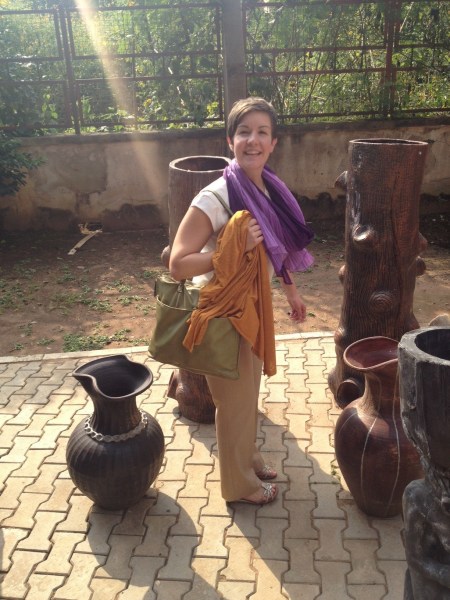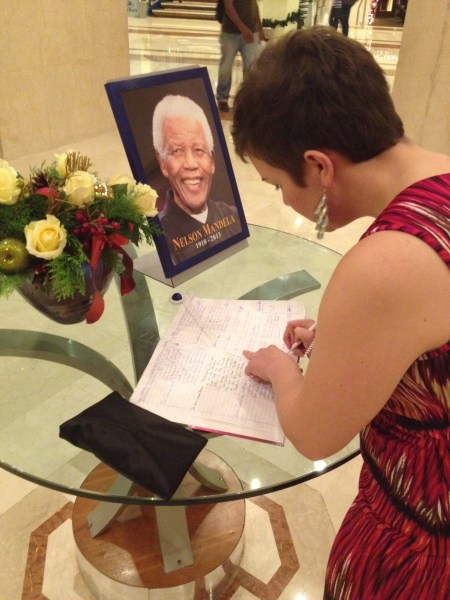Growing Connections and Getting Results
February 15, 2015
By: CLiGS
Prior to the Executive Masters of Natural Resources (XMNR), Maggie Striz Calnin was working for a consulting firm coordinating programs for the Greater Lansing Area Clean Cities Coalition to help in its mission of reducing the nation’s dependence on petroleum through local projects. Now? Maggie has branched out on her own and consults with clients as a strategist and project coach.
“I’m driven by work that delivers results and allows people to truly know they’ve done something good, to feel fulfilled. XMNR helped me to foster that drive and now I’m putting it into action in ways I couldn’t have foreseen while a student,” she says.
Maggie has shown her passion for the common good through an array of projects, ranging from helping to pass legislation for the Sleeping Bear Dunes Wildernessdesignation to capacity building efforts in Nigeria to assist their government in meeting President Goodluck Jonathan’s Transformation Agenda (PDF).

Maggie supported Pew Environment’s Campaign for America’s Wilderness by engaging locals in the wilderness designation effort in Michigan. She helped bring to light the widespread support for Sleeping Bear Dunes’ wilderness designation, while pushing individuals to connect with media outlets and members of Congress. Thanks to these grassroots efforts, Congress enacted the designation after a five year gap in wilderness action, the longest in its history.
She also credits the XMNR program for growing her network and providing her with professional international experience. “Both of those aspects have been very helpful, as my expanded network has led to new client opportunities and additional international work,” says Maggie.
She specifically recognizes the XMNR program, along with her background in project coordination, for helping her land a place on the Nigeria Assets Decision Support team. The team, with the Nigeria Infrastructure Advisory Facility (NIAF), a program encompassed within the U.K. Department for International Development (DFID), focused on helping with implementation of economic development projects. As the most populated African nation and second largest economy, Nigeria has been placed by economists among the MINT nations – Mexico, Indonesia, Nigeria, and Turkey – which are a set of countries to watch as potential global economic powerhouses. Nigeria’s Transformation Agenda’s priorities include job creation and inclusive growth, both in-line with this economic potential.
“The primary takeaway I like to share from being in Nigeria is the deep and sincere dedication of the government officials we worked with for improving quality of life for Nigerians. The drastic economic divide that exists is holding back the potential of the people and the economy of Nigeria. It’s a very big problem that is not easy or quick to solve. But, there is a sincere interest in resolving the problem and a lot of people are working tirelessly to see it resolved.”

Spanning 2011-2015, the Transformation Agenda (PDF) aims to provide direction to the current Nigerian administration based on priority policies and programs. Maggie’s project focused primarily on providing the government with evidence-based decision-making tools for economic development initiatives based around natural assets. This decision support system allows for documentation of all the assets available to a particular locality and in turn helps guide strategies for its development. Once fully operational, the System will be capable of delivering interactive and custom analysis to support investment decision-making.
“Given Nigeria’s incredible potential and capabilities, resources like the Nigeria Assets Decision Support System can assist the nation in meeting its goals and become a leader in building a global sustainable future,” says Maggie. “Relevant to the goals of XMNR, this approach to decision making is especially important to appropriately consider investments that impact natural assets, as these assets are very often non-renewable – once they’re gone, they’re gone.”
Earning a Master’s degree was an important part of helping Maggie grow and broadening her pursuits.
“It’s so important to recognize the connectivity between the local and the global for building a sustainable future. The XMNR degree has helped me to build an international work portfolio and is also helpful as I assist in urban renewal programs in my hometown of Detroit. Challenges of sustainability are truly relevant wherever we find ourselves.”





